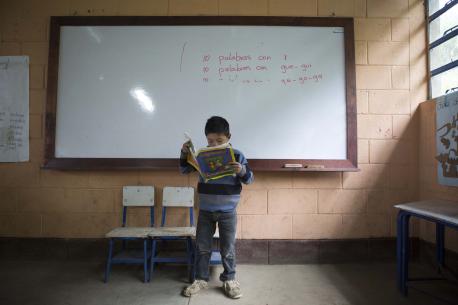
I am a Man and I Care about Ending Human Trafficking.
This blog will share Edgar’s narrative in doing anti-trafficking work, highlight how other men can get involved and stay involved, as well as outline the importance of men’s involvement in anti-trafficking work. This will serve as a call to action for readers looking to call on men to take action.
My journey:
Friends and family ask me why I do this line of work – anti-trafficking work. My response has changed over time from, “Because I care about women,” to “It could be my own daughter,” to “I refuse to live in a world where exploitation exists and do nothing about it.” It is clear that my journey and understanding of human trafficking has shifted from being centered on men and women’s importance in relation to men (which is already problematic), to seeing human trafficking as an issue that impacts everyone, including boys and men.
The truth is I am involved in this line of work not by choice, but by necessity. I have learned through other peoples’ narratives to listen and empathize – a skill I learned primarily from my Mexican-immigrant mother and grandmother who shared their stories of coming to the U.S. That empathy has led me to care deeply about social justice, equity, and human rights. This is what UNICEF has prioritized for the last 70 years.
I have never been ignorant of the fact that my masculinity has been shaped by the women around me; they have molded my male identity into something that is beautiful and complex and ever changing. Growing up, being a witness to gender-based violence, domestic violence, and systemic violence in my community coupled with poverty, was my normalized reality. Human smuggling and human trafficking were a part of my Latino community’s narrative, but not the complete picture. Through the stories shared amongst my extended family, usually over a warm meal or pan dulce, I learned about the other side of my community on the global scale. This included what men could do to fight for gender equality – these were simple actions like listen,empathize, and love. This is what I do now as the End Trafficking Fellow.
Fast forward to college, I learned more about what it means to be a man through a group of friends in college. Because of their willingness to share and empathize, I learned about the overlapping challenges that men go through. One of those challenges is the socialization to lack empathy and contribute to harmful social norms – ingredients in creating a demand for commercial sex and specifically sex trafficking. This socialization to lack compassion, to see another person as an ‘other’, and to strip away someone’s dignity and humanity makes it easy to hurt someone – even exploit them for money. I learned that men and children also fall prey to sex trafficking, and human trafficking as whole impacts many different people.
Human trafficking is an industry that does not discriminate against anyone; it is the demand and supply of people for the purpose of exploitation. I have also learned that while yes anyone can be trafficked, we cannot and should not ignore the fact that disproportionately foreign nationals, women of color, children, trans-youth, intersex-youth, youth that have experienced child abuse, runaway and homeless populations, and people living in poverty are at high risk of being trafficked across every bordered country.
Let’s narrow in on Sex Trafficking specifically.
Through the completion of an active bystander curriculum through the Office of Student Diversity and Multicultural Affairs at my alma mater, I was formally introduced to topics of gender-violence, masculinity, and harmful social norms. Later on, I learned that children are at high risk of being trafficked – we need to figure out how to put children first and prioritize their needs. We need to figure out how to get more men involved in anti-sex trafficking work and anti-trafficking as a whole.
Why is this important?
While traffickers can be anyone, disproportionately we know that the large majority of buyers for commercial sex are men. And we know that when there is an increase in demand for commercial sex, there is an increase in risk for children to also be exploited.
Which begs the question: Why is there such a high demand for commercial sex? How are we as men consistently underrepresented among advocates, but overrepresented among perpetrators and buyers?
It is important because men are rarely invited into the conversation of anti-trafficking work, and that is detrimental to the good work that is being done.
During the time that our team was at Florida International University in support of Shut Out Trafficking week, I realized the importance of having men in the space talking about human trafficking. It is a problem that affects various communities, and as a heterosexual cis-gender male I have the privilege of not having to constantly fear that this might occur to me – it is not my narrative or reality, despite it being plausible to happen to me.
What I have learned so far through my work as an End Trafficking Fellow:
A. Call out harmful gender norms: When you see other men mistreating, misguiding, and disrespecting others call out these behaviors. Cat calling women in public spaces, committing a sexual assault, pressuring others to commit acts of violence, shaming women with derogatory words, or harassing members of the Queer community are only a few of the items that men should step up against. It’s these forms of discrimination that can lead to the creation of demand for commercial sex and encourage the supply of people for the commercial sex industry.
B. See something, say something: It is never a game when you are dealing with peoples’ lives. Learning the signs of gender-based violence or partner-based violence is extremely important and can save a life. Although these signs are not explicitly connected to trafficking, the needs of someone being exploited can overlap. Learn the signs and be proactive in reporting what you see to the National Human Trafficking Hotline.
C. Educate others, encourage others to educate: Knowledge is key to addressing the issue of human trafficking - but put that knowledge to practice. Once you learn about harmful social norms and learn the signs, use your voice and encourage others to do the same.
D. There are assets in our communities: We all know our communities best and there are people, including men, working to end human trafficking and support the recovery and healing process of survivors. It takes a simple internet search to find out who is available in your area; or contact us, we would be more than happy to help in that search process.
The remainder of this month and beyond, we should continue to educate ourselves using the End Trafficking Toolkit, learn about the history of the work that has been done and what more needs to be done in our previous blog, learn the facts through the End Trafficking Fast Facts sheet and participate in the remainder of this month’s call to actions.
Calls to Action:
1. Sign our Pledge: We are calling on supporters like you take a pledge to stand with us to end trafficking, exploitation, and violence. Click on the link here!
2. Blog Posts: Keep up with our blog posts series throughout the month and the remainder of the year. If you want to write a blog post of your own, let us feature it – send it to us and share your story!
3. Follow us on social media: Keep up with all End Trafficking project related ideas and actions by following us on social media.
- Follow us on Twitter: @endtraffick
- Join our Facebook page: Shut Out Trafficking
- Follow us on Instagram: shutout_ht
Stay tuned for more activations and blog posts over the coming weeks! We look forward to working with you to continue raising awareness about child trafficking. Always Forward, Forward Always.
--
The End Trafficking project is the U.S. Fund for UNICEF’s initiative to raise awareness about child trafficking and mobilize communities to take meaningful action to help protect children. We do this by conducting workshops, facilitating film screenings, advocating for federal and state legislation and educating the American public on UNICEF’s work to protect children globally.


